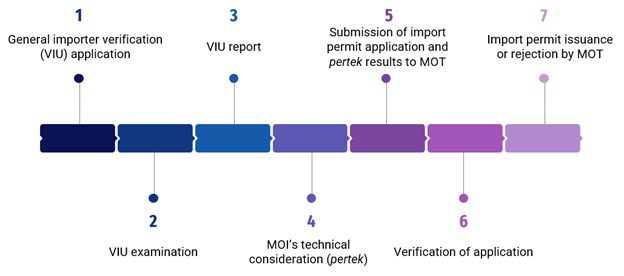Indonesia’s Ministry of Industry (MOI) has issued a new regulation requiring importers of textiles, textile products, bags, and footwear to furnish applicable trademark certificates when applying for an import permit. This means that a letter of appointment to import from the trademark owner or authorized representative is no longer sufficient to obtain an import permit for these goods.
The requirement is detailed in MOI Regulation No. 5 of 2024 concerning Procedures for Issuing Technical Considerations for Imports of Textiles, Textile Products, Bags and Footwear, which took effect on March 10, 2024.
Affected Products
The new regulation applies to the following products:
- Textiles: Fiber, thread, fabric
- Textile products: Carpets, other textile floor coverings, clothing, ready-made clothing accessories, other finished textile goods
- Bags: Suitcases, wallets, school bags, sports bags, handbags, other bags
- Footwear: Shoes, sandals, moccasins
Import Permits
In principle, businesses can import textiles, textile products, bags, and footwear as raw materials, auxiliary materials, or consumer goods (for trading) after obtaining the appropriate import permit from the Ministry of Trade (MOT).
There are three categories of import permits:
- General import permits for consumption (API-U), which are required for parties that conduct import activities for the purpose of trading;
- Import permits for producers (API-P); and
- Import permits for suppliers of raw or auxiliary materials (PPBB).
Applicants for an import permit must submit an application for general importer verification (VIU), the results of which will inform the MOI’s technical consideration process. If the MOI issues a recommendation or approval based on their technical consideration, applicants will be able to proceed with the submission of their import permit to the MOT.
The process of applying for and obtaining an API-U import permit has several steps, as shown in the diagram below.

New Trademark Certificate Requirement
Under the MOI’s March 2024 regulation, when applying for an API-U general import permit for textiles, textile products, bags, and footwear, the applicant is now required to submit trademark certificates for any products to be imported, along with the VIU.
Trademark certificates are not required when applying for API-P and PPBB import permits.
Impact
The new requirement to submit trademark certificates for the products to be imported is a significant issue for importers of affected products that have not obtained trademark registration in Indonesia, as they can no longer rely on letters of appointment to import from the trademark owners or authorized representatives.
This added requirement for imports of ready-made clothing, other ready-made textile goods, footwear, and bags comes in response to rapid increases in the circulation of imported goods, both in traditional markets and through e-commerce. The trademark certificate requirement is one of the steps taken by the government to tighten regulations on a number of imported commodities in Indonesia.
Importers need to discuss with brand owners early so that they can provide the proper trademark registration, which usually takes 1–2 years to obtain. This lead time will need to be factored in prior to obtaining the import permit.
For assistance with trademark registration for textiles, textile products, bags, and footwear in Indonesia, please contact Tilleke & Gibbins at [email protected].






